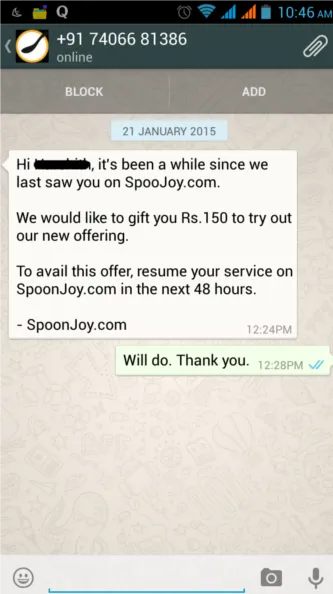How WhatsApp is changing the way businesses work

image credit: ShutterStockRaman is a vegetable vendor in Vadodara, Gujarat. Not too long ago, he used to take orders on call and deliver wherever required. But now, he takes a snap of whatever he has and sends it to a group of customers on Whatsapp. Customers get to see what he has to offer and if the vegetables are fresh before they place an order.
This is a huge behaviour change. And it has come about very fast! More and more people are getting hooked to their smartphones because of Whatsapp and Facebook (see how Internet startups have become mainstream in India). In an emerging economy like India, smartphone penetration has just scratched the surface. Whatsapp has played a big part in getting users to buy data plans and change their behaviour from using SMS to Internet-based messaging.
Apart from communication, Whatsapp is turning out to be a tool that is empowering many small businesses. Exploring this trend, we tried to figure out how startups are using Whatsapp and how this messenger app has become an integral part of business process.
“Whatsapp is a formal channel for communication in our operations and not just a casual messenger anymore,” says Nitin Jain of NowFloats, a startup that helps small businesses in getting discovered. The company has sales groups, emergency action group and co-founders group, and all these groups are constantly buzzing with activity. Startups are using Whatsapp for three major purposes:
Internal communication
Emails, Facebook and tools like Yammer and Base camp, etc. are available but none of them provide the same ease of use that Whatsapp gives. Mobile phones are like an extension of the human body now and the lightness that Whatsapp brings ensures that people on business groups notice the messages quicker and the corresponding action also comes about faster.
There have been efforts like Flock which is a Whatsapp for business so that users can separate their personal and professional lives, but we're far away from a point where such services really pick up.
Customer support
Handling communication with users is another aspect that Whatsapp helps in achieving. Businesses have dedicated Whatsapp numbers where users can message to get answers to their queries. Vijay, the Product Manager at NowFloats, shares a screenshot of one of the conversations:
And this is not restricted to businesses. The Delhi Police last year launched a dedicated helpline powered by WhatsApp: 9910641064. On the launch day, they received more than 23,000 messages and complaints via on this number. The Gujarat State Road Transport Corporation (GSRTC) is providing Volvo bus helpline service through WhatsApp. The service is available for complaints and suggestions from Volvo bus passengers and information related to the buses (91 992 546 6996).
Promotion
And of course, businesses are using Whatsapp to spread the word to more users. A couple of months back, Bewakoof.com started promotions via Whatsapp, and now they claim to be making 15% of their total sales through the instant messenger. Customers have to mention the product name, their name and address and send a Whatsapp message to get their delivery.
Spoon joy, a food delivery service in Bangalore, uses the application to keep the users engaged.

Bajaj Avenger Club in Bangalore has 1000+ members across various groups which are used to keep members updated about their various activities.
Such penetration is unforeseen and the impact Whatsapp has been able to have is truly commendable. We are in the midst of a huge change in how things are done and mobile is playing a crucial role in this. For Whatsapp, the focus has always been on growth and it has achieved that. Now it has millions of captive users which make it very lucrative for businesses and brands to make an entry and have their presence. This creates a few grey areas which will need answers as we go ahead:
Will Whatsapp allow transactions?
As per the policies, Whastapp is not meant for commercial purposes. "Sending ads or any other form of commercial solicitation" is an action that violates Whatsapps' ‘Terms of Service’. There is a thin line between 'communication' and 'promotion' and going forward, it might be an interesting possibility for Whatsapp to explore.
Number of member limitations
Talking of India, there are many instances where the 100 member per group limitation is coming in the way of organizations. More updates in this direction might be under way (Telegram's founder has already predicted some of the updates one might see on Whatsapp).
Lowering of attention span
This effect is not just related to Whatsapp but has more to do with the digital world. Applications like Whatsapp have ensured that people are online almost 24*7. Attention spans are going down, expectations are going up, and in the rush to do things faster, people end up feeling more rushed than ever. Is it really necessary to be responsive 24*7? Does this immediacy mean one will be able to get more things done? Are people really becoming more efficient?
These are some of the bigger questions to tackle, but looking at things the way they are, Whatsapp has played a huge role in changing behaviour in emerging markets and how the product evolves will also define how people do things in the future.
What do you think?







